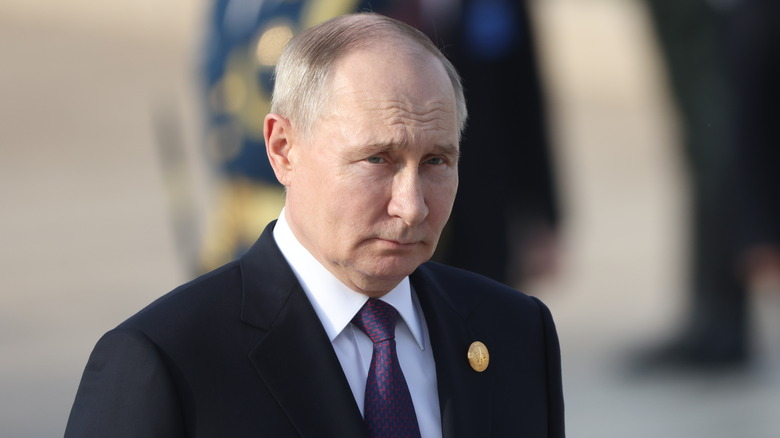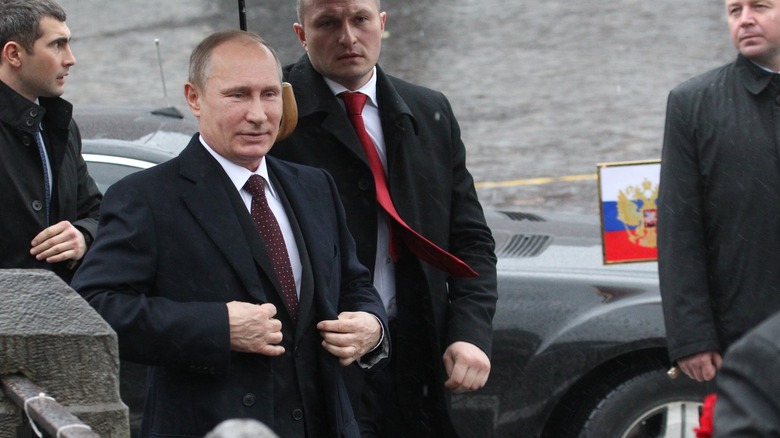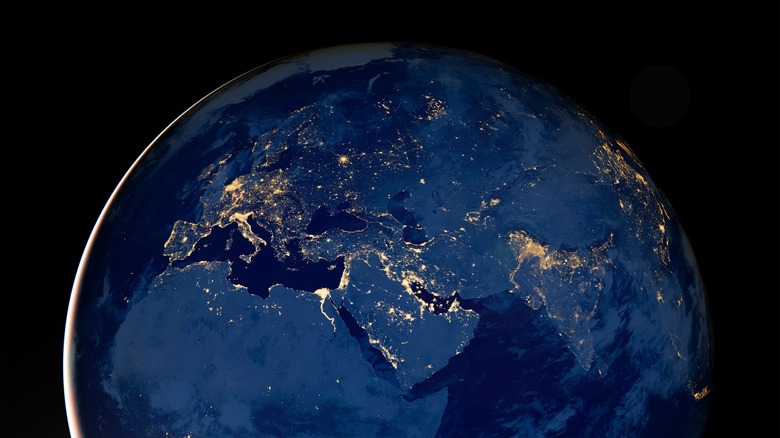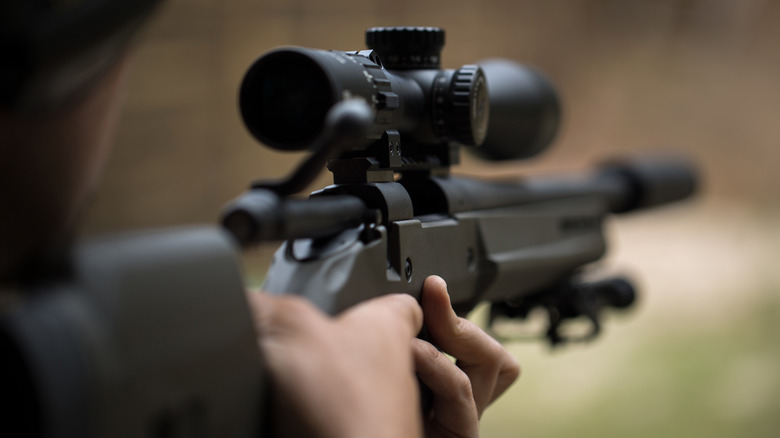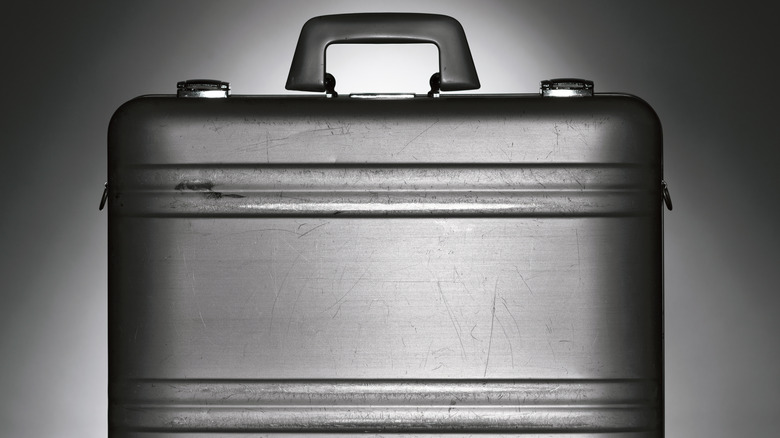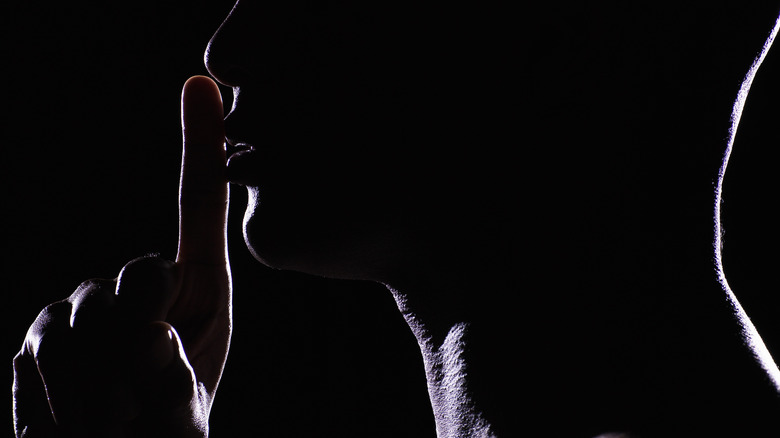Rules Vladimir Putin's Bodyguards Have To Follow
Russian President Vladimir Putin isn't exactly the most trusting person. In fact, he's downright paranoid. The newspaper Ukrainska Pravda describes him as paranoid about "the West" limiting his power (he's definitely not a fan of NATO). He's so paranoid about dissenters that vocal, anti-Putin Russians like Boris Nemtsov keep dying in suspicious circumstances that often resemble execution-style shootings. He's so paranoid about losing power that political rivals like Alexei Navalny get arrested and die in prison. He's so paranoid that he uses a secret train network and operates out of copy-pasted offices in differing cities. This is why Putin's bodyguards follow strict rules about everything from clothing to equipment to protocols based on their distance from him.
According to former Putin bodyguard Gleb Karakulov on The Guardian, Putin is "pathologically afraid for his life." A defector, Karakulov was captain in Russia's Federal Protective Service (FSO), a national bodyguard detail that traces its origins back to 1881. Back then, Tsar Alexander III created the FSO following his father's assassination via bomb at the hands of the revolutionary organization Narodnaya Volya, or "People's Will." Since then, the FSO has acted as the Russian version of the U.S.' Secret Service. It has a deep historical legacy of protection to uphold.
Putin's personal bodyguards comprise a separate, elite, hand-picked unit within the FSO. They refer to themselves as the "Musketeers," per The Economist, a moniker that highlights one protective duty of many. These Musketeers wield guns and information equally, and intervene equally in the physical and digital worlds.
Putin's bodyguards have strict physical requirements
When thinking of Vladimir Putin's personal protective measures, some folks might imagine him sitting at one end of a super long table, as he's taken to doing. Others might think of food tasters (to avoid food poisoning) and body doubles. All those things are apparently true, but they aren't related to the duties of Putin's bodyguards, who have one, ultimate, simple task: Protect Putin's body.
To do so, Putin's bodyguards — the Musketeers — have to meet some pretty stringent physical requirements. They've got to be between 5 foot, 9 inches and 6 foot, 3 inches tall and weigh between 165 and 198 pounds. While height can't exactly change, weight can, which means Putin's bodyguards have to stay in shape. Each guard is also relieved from his duties once he hits his 35th birthday.
As far as on-the-job duties are concerned, Putin's bodyguards have to wear the same suits and ties in any weather, from frigid to boiling. The rationale, according to Russia Beyond, is that thicker, heavier clothing impedes movement and might make it harder for guards to react in emergency situations. And speaking of clothing, bodyguards are supposed to be so resistant to the elements that they don't sweat. Reports indicate that they sometimes take some sort of drug that somehow helps them in this regard, although we don't have any details. Nicotine in cigarette form is an okay drug to take, too, provided it's off-hours and not on the job or during training.
They need knowledge of languages and politics
Interestingly, Vladimir Putin's bodyguards don't have to have any former police or military training. Rather, they have to demonstrate "operational psychology," which one of his former security employee's defined to Russia Beyond as the ability to predict dangerous scenarios and react to "invisible" threats. Bodyguards aren't soldiers who fight in combat situations — at that point they've already failed in their fundamental, preventative duties.
Russia Beyond continues by saying that knowledge of foreign languages, customs, and politics is just as important as physically protecting the president. In one instance when Putin paid a visit to China, video footage on TikTok shows one of his bodyguards demonstrating such "operational psychology" by circling around the politician to reposition himself at the leader's rear. One of Xi Jinping's bodyguards is standing directly behind Putin, which Putin's bodyguard might see as a potential threat. The bodyguard in question looks directly at Xi Jinping's protector, makes eye contact to let the man know that he's there, and smiles and nods. No language was needed in this instance.
But more than simply knowing about foreign politics and customs, Russia's Federal Protection Service (FSO) produces official intelligence reports. As Putin ordered and The Economist quotes, the FSO is responsible for developing "information-warfare measures, detections, warnings and consequence-management of computer attacks on Russian information resources." Presumably, Putin's FSO-bred Musketeers are privy to these reports, if not involved in generating them.
Four sets of protocols based on distance from Putin
And so we come to the moment-to-moment tactics that Vladimir Putin's bodyguards follow during "action" time, i.e., when the president is out and about in public, as Russia Beyond outlines. Bodyguards occupy one of four "circles" around the Russian leader, with each circle responsible for carrying out certain duties and obeying certain rules. The first circle comprises earpiece-wearing guards who stay ultra-close to Putin and act as human shields if he is under threat. These protectors are required to keep their hands in front of their body, and their left hand slightly raised to help them respond more quickly to any dangerous situation.
However, it's the second circle of guards that might spell the difference between Putin's life and death. These guards get a reprieve from wearing the mandatory suit-and-tie combo, and wind their way through crowds in civilian clothing while keeping an eye out for threats. Then there's the third circle, which forms a barrier around the entire group of people present at a given event and prevents anyone from entering and leaving the perimeter. And finally, we've got snipers, who hang out at high heights like rooftops and scan the crowd with laser-guided rifles and fingers near triggers, ready to shoot.
While there's no word on whether or not members of Putin's bodyguard rotate through these different circles, it stands to reason that each Musketeer has to demonstrate proficiency when operating within each of them.
His bodyguards wield specific equipment
Because we might as well include some weaponry and related equipment in this list, Vladimir Putin's bodyguards are required to carry certain high-tech items (that look rather low-tech). Each bodyguard, presumably in circles one through three, at least, has to carry the same sidearm — a 9-mm semiautomatic SR-1 Vektor pistol, aka the "Gurza." This modest-looking pistol packs enough power to pierce 30 layers of Kevlar and is banned in the United States. Also, it's silencer-friendly, which shouldn't come as a surprise. His bodyguards also carry bulletproof protective items like briefcases and Kevlar umbrellas that can deflect bullets — provided an assailant isn't wielding a Gurza, we presume. While the latter sounds like a ridiculous item straight out of a James Bond movie, it seems to be completely true.
As for other equipment, well, here's where things get a bit Hollywood. Russia Beyond says that "extreme driving" is a necessary requirement for many of Putin's bodyguards. Some detachment of his personal FSO retinue comprises a "heavy" spec ops unit that carries AK-47s, grenade launchers, anti-air missile systems, and some of the aforementioned sniper rifles. While we don't exactly have an org chart describing precisely how Putin's bodyguards are separated into this or that specialized group, we can assume there are some fairly strict rules at play determining who gets to drive the president's armored vehicles and who gets to wield military weaponry around him.
They must follow orders no matter what
The last item on our list might seem like a no-brainer, but becomes chilling when taken verbatim: Vladimir Putin's bodyguards are obligated to follow any order, no matter what. As the European Press Prize puts it, the president's personal Musketeers must exhibit an "unconditional willingness" to obey his every word. As bodyguard Alexey Dyumin on The Economist said, "There's never been a time when he's given me a task and I've said 'no.'" Note the word "task" in there, implying that there are range of under-the-hood duties that Putin's bodyguards might be called to perform besides the generic ones listed in this article. It also stands to reason that there are rules meant to keep guards quiet about state secrets and Putin's activities, but there's obviously no way to know what those rules would be.
And if anybody would know about such things it's Dyumin. He and two other top bodyguards — Viktor Zolotov and Oleg Klimentiev — have received rich, nepotistic rewards for their services, particularly in the form of some of Russia's top tracts of land. Dyumin even became governor of Russia's Tula oblast, while Klimentiev became first deputy director of the Federal Guard Service and Zolotov head of the National Guard. In an early show of shielding Putin's person, these gentlemen apparently even protected him from a bear way back in 1999.
